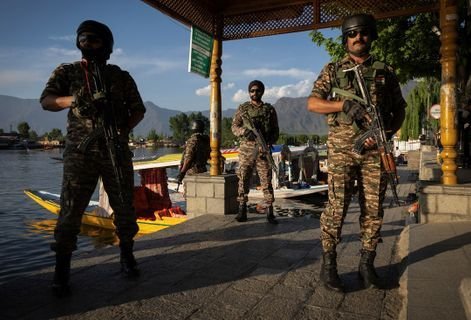After the attack, firing between India and Pakistan continued for the second day
Troops from India and Pakistan exchanged fire for the second consecutive day on Saturday, April 26, 2025, as tensions between the two nuclear-armed neighbours escalated following a deadly attack on tourists in India's Kashmir region. The attack on April 22 killed 26 people, leading to a number of punitive measures from both sides, including the suspension of a key water-sharing treaty and the closure of mainland border crossings. India accused Pakistan of supporting "cross-border terrorism", while Pakistan denied involvement and demanded an international investigation. The Indian army reported "unprovoked" small arms firing from several Pakistani army posts along the Line of Control, which separates the Indian and Pakistani-controlled areas of Kashmir. There were no casualties reported from the Indian side, and there was no immediate comment from the Pakistani military. Recent events:
Firing: Indian and Pakistani troops exchanged gunfire overnight for the second consecutive day, with the Indian army reporting "unprovoked" small arms fire from several Pakistani army posts along the 740-kilometer (460-mile) de facto border in Kashmir. The Indian army also responded with small arms, and there were no casualties on the Indian side.
Diplomatic measures: India has taken a number of punitive measures against Pakistan, including suspending the 1960 Indus Waters Treaty, which governs water-sharing from the Indus River and its tributaries, and closing mainland border crossings. Pakistan has responded by closing its airspace to Indian airlines, suspending all trade and halting special South Asian visas for Indian citizens.
International reactions: The United Nations has urged both countries to show "maximum restraint," while U.S. President Donald Trump has downplayed tensions, saying the dispute "will be resolved one way or another." However, the attack has sparked outrage in India and calls for action against Pakistan.
Search and investigation: Indian security forces are carrying out a massive search operation to find the suspects, including two Pakistani nationals, who carried out the attack in Pahalgam. The attack is the worst attack on civilians in the region in the last two decades and the Kashmir police have identified three suspects.
Background:
The disputed region of Kashmir has been a source of tension between India and Pakistan for decades. Both countries lay full claim to the region but rule parts of it separately. The two countries have fought two of their three wars over Kashmir and despite ceasefire agreements, there is frequent firing between their troops.
Impact:
Economic and diplomatic: The suspension of the Indus Water Treaty and the closure of key border crossings have significant economic implications for both countries. Indian financial markets fell sharply but also recovered some losses, while the Indian rupee and bond yields fell.
The tensions have led to heightened security measures and disruptions at the Attari-Wagah border crossing, where civilians are crossing the border amid tight security. The attack has also sparked protests in India, with demonstrators demanding action against Pakistan. Future Outlook: Diplomatic Channels: The situation remains highly volatile, and both countries maintain tough stances. India has called for an all-party meeting to discuss the government's response, while Pakistan has warned that any threat to its sovereignty will be met with strong reciprocal measures. The international community is closely monitoring the situation, urging both sides to de-escalate tensions. This summary provides a comprehensive overview of the ongoing tensions between India and Pakistan following the deadly attack in Kashmir, highlighting the most recent developments and their wider implications.
